by Jessica Dunn
UConn Early College Experience in partnership with UConn’s Department of Philosophy hosted the Fifth Annual Connecticut High School Ethics Bowl on the UConn Storrs Campus. Dr. Mitchell Green, UConn ECE Faculty Coordinator managed and supported this year’s event. This year there were ten teams from eight high schools around the state who competed: Hotchkiss School, Choate Rosemary Hall, Masuk High School, Torrington High School, Wilcox Technical High School, the Hopkins School, Xavier High School, and Trumbull High School.
Students arrived for the day-long event with excitement and eagerness to engage with one another and debate the most challenging ethical issues of our time. Teams consisted of 3-7 students each who were judged by philosophers from both UConn and Yale on the breadth and depth of their thinking. This regional competition is a qualifier for participating in the National High School Ethics Bowl at UNC- Chapel Hill, and this year’s competition was very impressive, with Hotchkiss School coming out on top as the #1 winner, and Choate Rosemary Hall as the runner up.
UConn looks forward to hosting this event again in 2025, as Yale University will host the 2024 regional competition.
Author: Carissa Rutkauskas
Congratulations to the UConn ECE Student Scholarship Winners
Increased Scholarship amounts garner more competitive application pool.
By Jessica Dunn
UConn Early College Experience increased the student scholarship amount for each available award to $1,000 this year! For many years, the scholarship award was $500 each, and we are excited to be able to increase the value of these scholarships to $1,000 each. Partly due to the increase in value for these scholarships, we received a record number of incredibly competitive applications, making the selection process difficult.
Through a rigorous review process, the UConn Early College Experience Office selected six outstanding 2022-2023 UConn ECE Students as Scholarship winners, awarding each a $1,000 scholarship to be used at any institution. All winners are high school seniors, who have taken or are currently taking at least one UConn Early College Experience course and have excelled in the area in which they submitted their project. Additionally, applications are scored on a holistic rubric which aims to capture a variety of factors including academic success, future academic aspirations, and demonstrated financial need.
Winners talk about their projects in this video. Additional information about UConn ECE Scholarships can be found on our Student Scholarships page.
Excellence in the Arts, Humanities, or Social Sciences
Winners demonstrate academic achievement and a potential for future academic and professional accomplishments in a field focusing on the Arts, Humanities, and/or Social Sciences.
 |
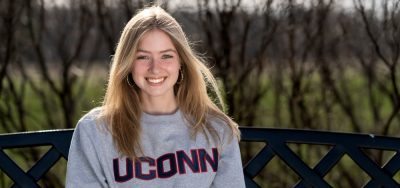 |
| ZULEYDY TORRES CREC Academy of Computer Science and Engineering Original Project, “The Real Talk on: Anxiety and Depression” |
LUCY HOMER Hall High School Personal Essay, “Children of Sunshine and Rain” |
Excellence in Science, Technology, Engineering, or Mathematics
Winners demonstrate academic achievement and a potential for future academic and professional accomplishments in the fields of Science, Technology, Engineering, and/or Mathematics.
 |
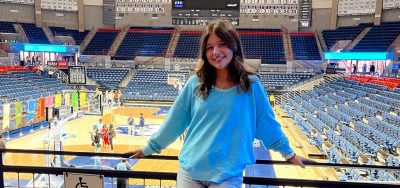 |
| KATERINA NGUYEN Trumbull High School Original Coding of a Murder Mystery Game |
NATALIA MOCARSKI New Britain High School Research Paper on Serotonin Receptors |
Excellence in Civic and Community Engagement
Winners are academically successful, are already making a positive difference in their town or neighborhood, and are inspiring others to do the same. The students chosen for this award are UConn ECE Students who demonstrate ambition and self-drive evidenced by outstanding achievement in both school and their community.
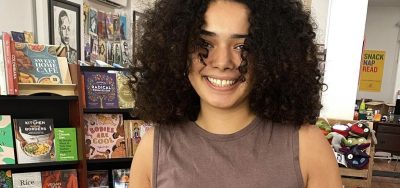 |
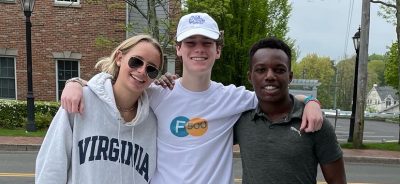 |
| ELSA HOLAHAN James Hillhouse High School Youth Director at Dixwell Community Q House |
OLIVER TUFF (center) New Canaan High School Founder of Feeding 500 |
Students Shine at Connecticut Science Olympiad
By Janet Belvel
CT State Director, CT Science Olympiad
UConn ECE Instructor at South Windsor High School
(UConn AH 1000, Intro to Allied Health Professions & AH 2001, Medical Terminology)
UConn ECE was happy to host the return of the in person 2023 CT State Science Olympiad Competition (ctscioly.org) on March 11th. This annual event brought together some of the brightest young minds from across the state to showcase their scientific skills, problem-solving abilities, and teamwork. The day was filled with excitement, collaboration, and intense competition as these budding scientists left no stone unturned in their quest for victory.
Science Olympiad is a highly regarded competition that challenges students in various scientific disciplines, including biology, chemistry, physics, engineering, and more. With an impressive lineup of over 23 events, the participants were required to exhibit their knowledge, innovation, and analytical thinking. Over 40 Science Olympiad teams from around the state showed remarkable dedication, preparing rigorously for months leading up to the event.
This year South Windsor High School defended their title to emerge as the State Winners and will represent Connecticut at the National Tournament in Wichita, Kansas in May. Rounding out the top high school teams were Glastonbury, Hopkins, and Staples with outstanding performances. Wilton was awarded the Best New Team for this year by demonstrating their exceptional skills throughout the competition. The spirit of camaraderie was palpable as team members encouraged and supported each other, showcasing the true essence of the Science Olympiad. Their passion for science was reflected in every task. It was apparent that their hard work, combined with their commitment to excellence, propelled them towards success.
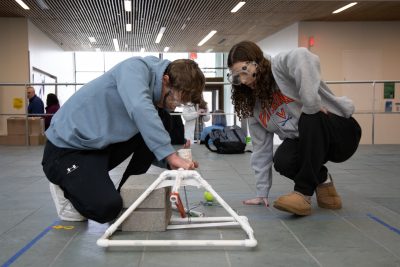
Participating in Science Olympiad is more than just a competition; it is an opportunity for young minds to explore their passion for science and ignite their curiosity. Teams are challenged in building and engineering events as well as written performance and experimental design. On campus, you could see everything from glider planes being flown in Hawley Armory to a Forensic Crime Lab run in the Chemistry Building. These are the experiences that create lasting memories for high school students and inspire them to join the next generation of scientists.
The success of the Connecticut Science Olympiad competition reflects the importance of cultivating scientific curiosity and encouraging students to pursue their passion for science. This would not be possible without the support of the coaches, parent and community volunteers, and the staff of the ECE program.
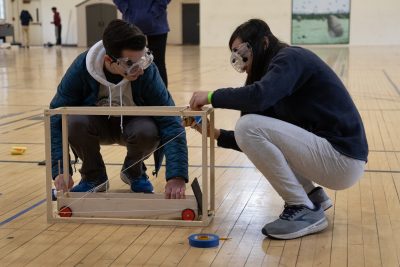
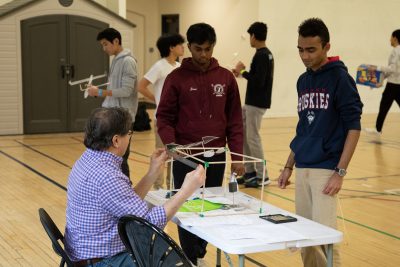
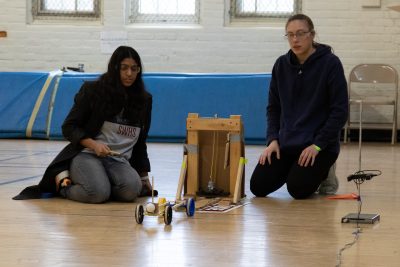
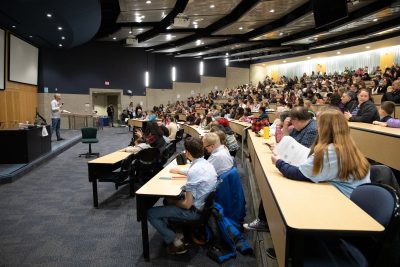
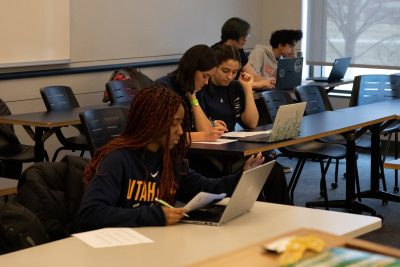
UConn ECE Magazine Cover Submissions
We challenged our community to submit artwork with the prompt: Growth Mindset: Challenging the status quo and received many fabulous submissions.
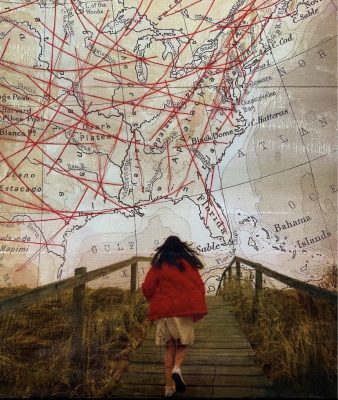 First Place/cover
First Place/cover
Jane Freiler, Fairfield Ludlowe High School
The Voyager, mixed media
This piece is a connection of the person I am through the places I have been and the places I have yet to go. The strings tie the self of selfhood to the natural land, the county, and our memories. I constructed this piece from the parts of my past, the thread I used to make friendship bracelets, an old map I weathered and tore, and simple package tape from the closet. The package tape transfer is a simple and beautiful method to blend separate images, such as my photograph of the girl, seamlessly with the map.
 Second Place
Second Place
Lila Gillon, E.O. Smith High School
A Hyacinth Peeks Out from Among Green Stalks, photo
This issue’s theme of a “growth mindset” immediately calls to mind the joyful perseverance and adaptability of spring plants. In this close-up photo, a purple hyacinth is dwarfed by the tall green stalks all around it yet still manages to bloom. I imagine the flower’s undaunted display of color as symbolizing a challenge to the status quo - regardless of what else surrounds it, it can thrive and proudly showcase its unique qualities.
 Third Place
Third Place
Ella Sigurdsson, Ridgefield High School
Unplugging, mixed media
Social media and electronics have become a prominent part of our everyday lives. Everyone is expected to be on social media and when “unplugging” I challenge the status quo. My work is comprised of a collage for the background of the photo and I created an original makeup as well as taking my own photo.
UConn Chemistry May ECE Lab Day
by Dr. Michael Kienzler
Assistant Professor
UConn Chemistry
Dr. Fatma Selampinar
UConn ECE Faculty Coordinator for Chemistry
Associate Professor in Residence UConn Chemistry
On May 18th, the UConn Chemistry Department hosted the May ECE Lab Day (MELD) for students taking UConn Chemistry at their high schools. UConn Chemistry opened its doors to almost 125 high school students from Berlin, New Britain, Norwich Free Academy, O. H. Platt, and The Woodstock Academy at the UConn Storrs Campus. MELD was coordinated by the UConn Early College Experience Program Office in partnership with UConn ECE Faculty Coordinator, Dr. Fatma Selampinar and Assistant Professor in Chemistry, Dr. Michael Kienzler. The event started with a presentation by Dr. Kienzler on a surprising phenomenon for a select group of molecules—a process called photoswitching. The lengthy Q&A session after the presentation showed the remarkable interest from high school students on the topic. Next, the students transitioned to the hands-on activities where they split into groups and went to six undergraduate teaching laboratories. In the labs they did a set of experiments designed by Dr. Kienzler and supervised by graduate students, to learn more about photoswitches. Small groups of high school students synthesized a bright red azobenzene dye and then recorded the ultra-violet/visible spectrum for their molecules. At the same time, students learned about thin-layer chromatography and used this chemical separation method to observe photoswitching of an azobenzene after shining light on it.
The event enabled the high school students to have a hands-on laboratory experience on the UConn campus and provided opportunities for students who are interested in doing research of their own to communicate and connect with a research faculty member, Dr. Michael Kienzler, and research graduate students.
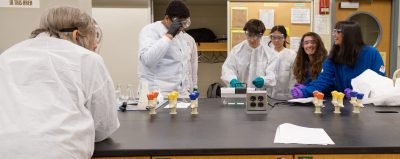
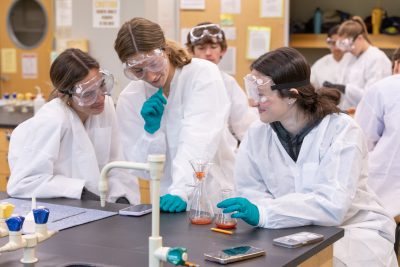
Feedback from the Instructors was inspirational and provided confirmation of the true benefit to the student participants:
“My students were raving about the quality of the presentation and correlated lab experience. They were inspired to ponder the connections between their own understanding and the concept of photoswitches.” – Brendan Wilkosz, Berlin High School
“The students and I thoroughly enjoyed the presentation and the lab experience! The event was well orga-nized and hands-on which is most engaging for the students.” – Manila Mathur, New Britain High School
“I can say that my students were excited by the new (to them) subject matter in the lab experiment and inspired by being at the University and in a college setting, if only for a day. We will now finish our school year with renewed enthusiasm thanks to the UConn trip!” – Donna Kaiser, Stamford High School
“It was fantastic! The students thoroughly enjoyed it. I’m just sorry I couldn’t have convinced the others in my class to sign up for the UConn ECE program, because I know they would have loved it as well.” – Nike Agman, Enfield High School
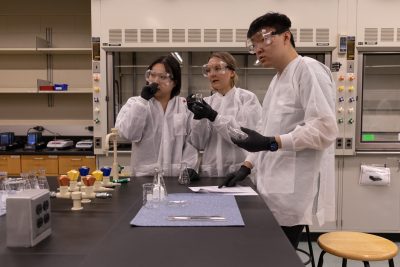
Additional UConn ECE Benefits
By Jessica Dunn
Discount Tickets
As part of the UConn ECE Community, Students, Instructors, Site Representatives, Library Media Specialists, and Faculty Coordinators have access toattend select UConn athletic events and performances at the JorgensenCenter for the Performing Arts at discounted rates! UConn Early CollegeExperience has partnered with UConn Athletics to offer YOU the opportunity to be in the stands and show your Husky pride with your friends andfamily. We have also partnered with Jorgensen who offers UConn EarlyCollege Experience Students and high school partners, with a valid UConn NetID, FREE tickets to a selection of their annual performances.
Available athletic event tickets and Jorgensen performance offers are announced throughout the academic year to the UConn ECE Community. Take advantage of these great offers and opportunities to immerse yourself in the UConn culture. Hundreds of UConn ECE partners did this year! You may not be in Storrs, Avery Point, Hartford, Stamford, or Waterbury, but you are a part of UConn wherever you are. Bring your class, your friends, or your family to a game or a show! This is just one of the many benefits of being part of the UConn ECE family, and we hope to see you on campus.
Find your tickets here: s.uconn.edu/ece-discount-tix
Don’t forget, show your Husky Pride and tag us in your photos from the games and shows you attend!
Facebook | Twitter | Instagram | TikTok
UConn Recreation Center Access – just for our partners
UConn ECE Instructors, Site Representatives, and Library Media Specialists are eligible foraffiliate membership to the UConn Recreation Center. UConn ECE administrative partners must provide a UConn One Card for purchase of membership.
Connecticut History Day Returns to Storrs
By Christopher Todd | Body and participant data by Cyndee McManaman, CT History Day Regional Coordinator
On a brisk Saturday at the onset of UConn’s spring break, over 200 students accompanied by family, friends and educators descended upon UConn’s Storrs Campus to participate in the Connecticut History Day’s Mansfield/Storrs Regional Contest. Organized by the Connecticut Democracy Center, in partnership with the Department of History at UConn as well as UConn’s Office of Early College Programs, Connecticut History Day (CHD) successfully returned to in-person on the Storrs campus after a three-year hiatus during the Covid pandemic.
Connecticut History Day
Connecticut History Day is an affiliate program of National History Day (NHD) which annually engages nearly 5,000 middle and high school students in historical research, interpretation, and creative expression through project-based learning. As stated by the CHD, the program seeks to bring students, teachers, museums, and scholars together to support young people as they engage in history. Led by the Connecticut Democracy Center, CHD is presented with major funding and partnership support from CT Humanities.
CHD offers a wide array of free resources for teachers and students to assist them with the History Day process, including:
- Teacher Handbook (English and Spanish)
- Student Handbook (English and Spanish)
- Educator Workshops
- In-class student workshops
- Digital resources for research and writing
Mansfield/Storrs Regional Competition
Throughout the Northeastern Connecticut Region, 23 teachers representing 27 schools brought History Day into their classrooms during the 2022-2023 school year. The Northeastern region supported 536 of the statewide 4670 school-level participants, with 224 students attending the Mansfield/Storrs Regional Contest at UConn on Saturday, March 11th. In all, CHD held 6 regional contests around the state with the state contest held at Central Connecticut State University (CCSU) on May 6th. As 47 Connecticut students head to University Maryland – College Park this June for the National Contest, 22 of them are students from the Northeastern Region.
Because of the unique design of CHD, teachers have the flexibility of using the History Day program in a format that meets their diverse needs: integrated into the content area or honors/enrichment curriculum or as an after-school activity or club. Students have the flexibility of working alone or in a small group to create a project in one of five formats: documentary, exhibit, historical paper, dramatic performance, or a website. The students select a topic that interests them and then use the annual theme as a lens through which to view and analyze their research and frame their projects.
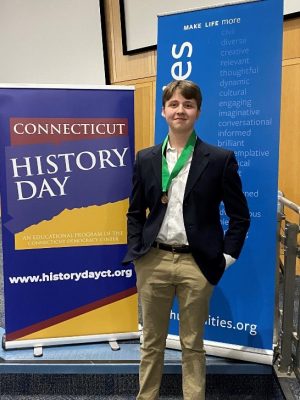
While at the Mansfield/Storrs Regional Contest, CHD teachers Dr. Matt Cieslowski (UConn AMST 1201: Seminar in America Studies) and Ian Webster (UConn HIST 1501 & 1502: US History to 1877 & Since 1977; HRTS 1007: Intro to Human Rights) from Manchester High School were recognized as this year’s recipients of the Patricia Behring History Day Teacher of the Year Award-Senior Division for Connecticut. Patricia Behring was a longtime benefactor of National History Day, and each affiliate selects a teacher for the Junior and Senior divisions to then compete for the honor of becoming recognized as the National History Day Teacher of the Year at the national contest in June.
It was wonderful to support the return of CHD’s Mansfield/Storrs Regional Contest to the Storrs UConn campus. All the hard work and planning by participants, families and program staff alike translated into an amazing day for CHD. Who better to share some highlight than the participants themselves.
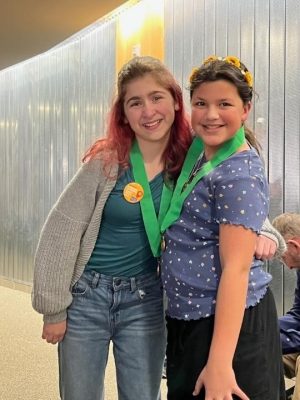
Comments from students at the Mansfield Regional Contest:
“The thing I liked best about the Regional Contest was that I got to be an expert on a topic I had a lot of interest in. I truly feel like I know a large amount of information regarding my topic and am happy to have this knowledge that really no other experience could provide me with.”
“I thought that it was really fun to be a part of something that so many people were invested in and took so much pride in being a part of this contest.”
“The thing that I liked best about the contest is that I got to do a project on a topic of my choosing.”
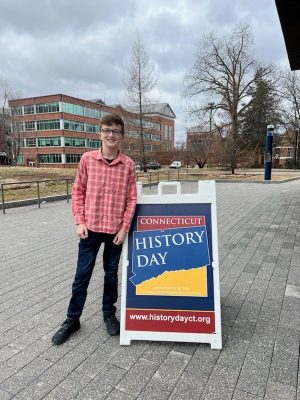
Comments from parents at the Mansfield Regional Contest:
“She gained significant research and writing experience, honed her time management skills, speaking with judges was a good public speaking experience.”
“Great learning and growing experience! An overall beneficial experience in character building.”
Comments from teachers at the Mansfield Regional Contest:
“History Day offers a variety of academic challenges for students. Developing a long-term, well-researched project is quite a daunting task for students who often have been asked [at best] to complete a ‘research’ project over the course of a few weeks. Scheduling time to work on a project over a few months’ time and meeting deadlines for registration, paperwork upload and finally project submission is an excellent learning experience for all participants.”
“Participation in History Day enhanced their research skills and attention to detail in formal academic work; challenged them to reach higher standards for their work.”
Comments from judges at the Mansfield Regional Contest:
“As a future teacher, I found it a great experience not only the judging but also seeing the students work, and talking with other professionals in History, and hearing not only their approach to judging but what they do in their work and their experiences. It’s a great way to connect with people!”
“I am always so impressed by the students’ knowledge, level of commitment, and energy.”
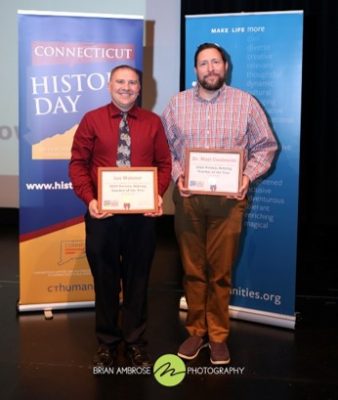
Professional Development and New Instructor Orientation
By Stefanie Malinoski
Professional Development Workshops
UConn Early College Experience Faculty Coordinators offer annual professional development workshops for their Instructors. This spring, UConn ECE hosted twenty-nine different professional development workshops for certified Instructors. Many of these events occurred in person on the Storrs and Hartford campuses and others were held in a virtual capacity. Some highlights are below. Please be sure to check out the UConn ECE Professional Development Blog on the ECE website for details and pictures from our events.
Animal Science
Our certified Animal Science Instructors along with Faculty Coordinators Dr. Jenifer Nadeu and Dr. Amy Safran took a tour of UConn’s animal facilities including the voluntary milking system, and Molly Riser, UConn ANSC PhD student, provided an overview of the domestication and breeding of dogs.
Anthropology
Along with ECE Faculty Coordinator, Dr. Alexia Smith, certified UConn ECE Anthropology Instructors met for a virtual workshop where they focused on practical strategies for teaching anthropology today and recent changes within the field. Hot topics such as participation agreements, accessibility issues, and engagement modalities were the main topics of discussion. UConn’s Dr. Noga Shemer served as a guest facilitator for the workshop. Dr. Shemer is an Assistant Professor-in-Residence of Anthropology at UConn, where she also serves as an Affiliate faculty member of El Instituto (Institute of Latina/o, Caribbean, and Latin American Studies) and as an Assistant Director of Faculty Development at the Center for Excellence in Teaching and Learning. As a cultural anthropologist with many years teaching experience, she provides workshops across the university focusing on diversity, equity, and inclusion in the classroom and has published journal articles focusing on her use of person-centered ethnographies to build empathy.
Art
UConn ECE Faculty Coordinator for Art, Prof. Cora Lynn Deibler, met with UConn ECE Art Instructors for their virtual professional development session and invited Dr. James J. Hughes to speak with the group about artificial intelligence (AI) in the art world. Dr. Hughes is an American sociologist and bioethicist. He serves as the Executive Director of the Institute for Ethics and Emerging Technologies and as Associate Provost at UMass Boston. He writes and speaks often on topics of bioethics, technology, and Buddhism. The group listened to Dr. Hughes’ presentation and engaged in a lively conversation discussing the rise of technological art-generating tools that use artificial intelligence. While students are interested in new AI tools, established artists are skeptical – even fearful. The group discussed strategies for talking about, contextualizing, and using or discouraging use of AI artmaking in our classrooms.
Biology
Dr. Thomas Abbott, Associate Professor In-Residence and ECE Faculty Coordinator for Biology, met with a group of fifty Instructors for an on-campus workshop. The Instructors engaged in hands on laboratory experience dealing with Maltose Transport Assays with Dr. Chris Malinoski, Assistant Professor in Residence and Rebecca Newcomer, Laboratory Manager for UConn’s undergraduate Biology 1000 courses.
Educational Psychology
Dr. Joe Madaus invited author of “The Lottery”, Patricia Wood, to speak with our group of certified Special Education Instructors. Patricia shared her personal experiences with the group in a lively virtual discussion all the way from Hawaii!
Spanish
Faculty Coordinators for Spanish Dr. Guillermo Nanclares and Dr. Eduardo Urios-Aparisi invited special guest Dr. Maria Lourdes Casas to speak to a group of 40 UConn ECE certified Spanish Instructors. Dr. Casas is a professor in the World Languages, Literatures, and Cultures Department at Central Connecticut State University.
UConn Early College Experience New Instructor Orientation
New Instructor Orientation occurred in May on the Storrs campus for over 150 newly certified ECE Instructors. Returning to an in-person event for the first time since 2019 the morning was spent covering all things Early College Experience. Topics included: student registration, instructor responsibilities and resources, creating a UConn ECE community, data highlights, enrichment programs, and Pre-College Summer. After some Q&A and lunch as a group, teachers met with their ECE Faculty Coordinators for discipline-specific orientation sessions.
Instructors shared their feedback after orientation and some mentioned that they were happy to hear that UConn ECE is aware of the struggles teachers may face convincing their school boards that running multiple UConn course offerings is beneficial to their students and faculty. They are now aware that the ECE program staff is willing and able to help teachers work with their schools to promote and “package” their UConn courses (with meetings, promotional materials, etc.). Most Instructors reported they enjoyed learning about how to create a UConn ECE community in their classrooms and schools and were grateful to have the opportunity to participate in orientation in person to meet with their discipline specific UConn Faculty Coordinator.
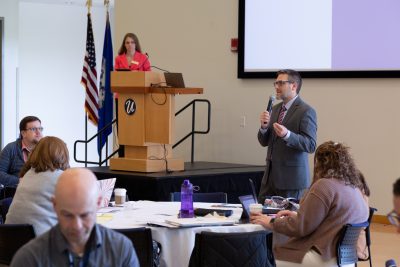
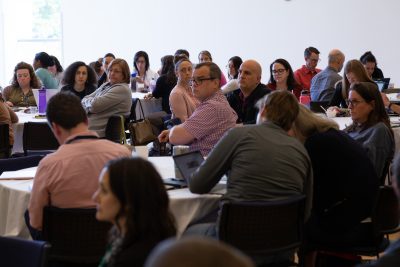
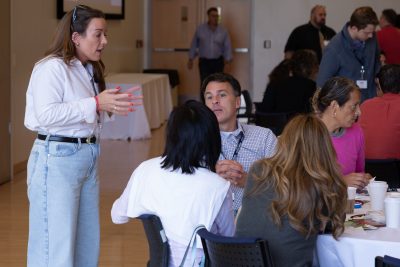
UConn ECE Offers Additional Courses
UConn ECE is continuously partnering with new UConn academic departments to offer additional UConn courses in the high schools. Here are our most recent:
 Asian American Studies (Dr. Jason Chang)
Asian American Studies (Dr. Jason Chang)
• AAAS 2201: Introduction to Asian American Studies
A multidisciplinary and interdisciplinary introduction to major themes in Asian American Studies. Concepts of identity and community, migration and labor histories, Asians and the law, representations of Asians in visual and popular culture, gender issues, interracial and interethnic relations, and human rights.
A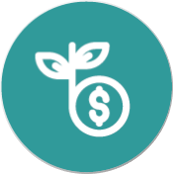 gricultural and Resource Economics (Dr. Emma Bojinova)
gricultural and Resource Economics (Dr. Emma Bojinova)
• ARE 2210: Essentials of Accounting and Business
An analysis of basic business principle, fundamentals, and concepts for agribusiness entrepreneurs.
 Computer Science and Engineering (Mr. David Strimple)
Computer Science and Engineering (Mr. David Strimple)
• CSE 1010: Introduction to Computing for Engineers
Introduction to computing logic, algorithmic thinking, computing processes, a programming language and computing environment. Knowledge obtained in this course enables use of the computer as an instrument to solve computing problems. Representative problems from science, mathematics, and engineering will be solved.
 Communication (Dr. Svetlana Kalnova)
Communication (Dr. Svetlana Kalnova)
• COMM 1000: The Process of Communication
A study of modern communication theories and principles useful in understanding how you affect and are affected by others through communication. Methods to develop your communication skills, the role of technology and media in various aspects of daily life.
• COMM 1100: Principles of Public Speaking
Theory and performance in public speaking: methods for organizing presentation and delivery skills, over coming anxiety of speaking in public; audience analysis; maximizing message impact; professional presentation skills; evidence; listening and speech evaluation.
![]() English (Dr. Tom Deans)
English (Dr. Tom Deans)
• ENGL 3082: Writing Center Practicum
Introduction to Writing Center pedagogy, theory and research methods. Intended primarily for students staffing UConn ECE Partner School Writing Centers. Students taking this course will be assigned a grade of S (satisfactory) or U (unsatisfactory).
 Earth Sciences (Dr. Robert Thorson)
Earth Sciences (Dr. Robert Thorson)
• ERTH 1000E: The Human Epoch: Living in the Anthropocene
Introduction to geoscience focusing on human activities as agents of geologic change. Examines human planetary processes in our current epoch, the Anthropocene. Provides a novel frame for contemporary environmental issues such as climate change, sustainability, mass extinctions, land use, and waste disposal.
• ERTH 2800: Our Evolving Atmosphere
An introduction to atmospheric science, including a history of the field, features of the atmo sphere, weather forecasting, and a geologic history of climate change.
Congratulations to our 2023-24 Course Enhancement Award Winners!
By Nella Quasnitschka
UConn Early College Experience is happy to announce the return of the Course Enhancement Awards for UConn courses taught in partner high schools. Eligible UConn ECE partners were invited to submit proposals for two types of projects: (1) Classroom Enhancement and (2) Community Development. Below is a list of proposals that have been funded for the 2023-24 academic year. We look forward to sharing results and outcomes with you next year.
Bullard Havens Technical High School
ECE Instructor: Bridget Wrabel
UConn Course: ENGL 1007: Seminar and Studio in Academic Writing and Multimodal Composition
Description: A class set of “Worn Stories” by Emily Spivack will be purchased to help build their classroom library.
Christian Heritage School
ECE Instructor: Jamie Cosgrove
UConn Course: BIOL 1107: Principles of Biology I
Description: Students will have hands on experience to new technology that they otherwise would not be exposed to because of Professor Cosgrove’s effort to secure funding for a new CRISPR lab set.
East Hampton High School
ECE Instructor: Kasey Tortora
UConn Course: HDFS 1070: Individual & Family Development
Description: A Reality Works Pregnancy Profile Simulator will be purchased to help students understand pregnancy’s impact on the body. The goal of these simulation experiences is to give students real hands-on exposure to pregnancy and stages of life.
Glastonbury High School
ECE Instructor: Laura Haddad
UConn Course: ENGL 1007: Seminar and Studio in Academic Writing and Multimodal Composition
Description: Microphones will be purchased to script and record informational podcasts. This multi-modal project allows students to have a voice and to practice putting their writing into real-world applications.
Hall High School
ECE Instructor: Connie Xu
UConn Course: CHIN 1114: Intermediate Chinese II
Description: Lanterns, dragons, mahjong, tea set, and calligraphy are great authentic materials that will be acquired for the classroom over the years. What was missing was a karaoke machine – a very popular form of entertainment among Chinese culture across age groups.
Lewis S. Mills High School
ECE Instructor: Laura Faga
UConn Course: FREN 3250: Global Culture I
Description: This award will allow students to attend the French Quiz bowl in the Fall of 2023. Students will return to their school and share the knowledge they have gained with younger students.
Middletown High School
ECE Instructor: UConn ECE team
UConn Course: HIST1300: Western Traditions Before 1500, HIST1400: Modern Western Traditions, ENGL 1007: Seminar and Studio in Academic Writing and Multimodal Composition, ANSC 1676: Introduction to Companion Animals, ANSC1602: Behavior and Training of Domestic Animals, SPSS 1110: Fundamentals of Horticulture, and HRTS 1007: Introduction to Human Rights
Description: This award will be used to support an all-day community event for Middletown High School students. Students will be able to network with community members and explore resources available to them. Middletown High School Pride Leaders, who are students that take UConn ECE courses, will lead events, direct students, and be positive role models. This event will benefit all involved parties.
Newington High School
ECE Instructor: Carla Toney
UConn Course: ILCS 3239 & ILCS 3240: Composition & Conversation I & II Description: With the goal of increasing opportunities for students to access authentic materials, funds have been provided to create a readers’ library in the classroom.
Ridgefield High School
ECE Instructor: JR Condosta
UConn Course: ERTH 1051: Earth’s Dynamic Environment
Description: Funding for this award will support the development and implementation of a self-guided geoscience walking trail on the Ridgefield High School campus. This educational walking trail will be a valuable resource for students in various high school courses and members of the community. It will provide an engaging way to learn about the geology and natural history of the area.
Trumbull High School
ECE Instructor: Gregg Basbagill
UConn Course: ECON 1201: Principles of Microeconomics
Description: One major deficiency in Mr. Basbagill’s course is the gap between the economic models being taught and the lived experience in the real world. To address this gap, microphones will be purchased so students can begin podcasting. This will allow students to develop a more empathic understanding of how inflation, unemployment, and output affect actual people.
University High School of Science and Engineering
ECE Instructor: Caryn Baseler UConn Course: MARN 1001E: The Sea Around Us
Description: Students in the UConn ECE Marine Sciences class will visit Meigs Point Nature Center and participate in their Three Shoreline Ecosystems program so students can visualize and apply what they have learned in class to the rocky shore, sandy beach and salt marsh ecosystems.
Waterbury Career Academy
ECE Instructor: Frank F. Marcucio, III
UConn Course: AH 4092: EMT Training
Description: Funds for this award will go towards the purchase of cardiopulmonary resuscitation mannequins that record their performance and interface with AEDs. This will provide immediate feedback to Mr. Marcucio’s students. The mannequins will allow students to develop and hone their skills and address inadequacies in a scientific method based on recorded performance.
The Woodstock Academy
ECE Instructor: Sharon Geyer
UConn Course: CHEM 1127Q & CHEM 1128Q: General Chemistry I & II
Description: This classroom enhancement award is for the acquisition of Go Direct sensors and probes that will allow the implementation of science experiments in UConn ECE courses. The sensors will be used throughout all UConn ECE Science courses, allowing approximately 160 students annually to benefit.
The Office of Early College Programs will award UConn ECE Course Enhancement Awards again next year.